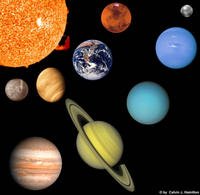 The Japan Aerospace Exploration Agency is in the process of retrieving asteroid samples. The Hayabusa spacecraft , launched in May 2003, intercepted the asteroid Itokawa, landed on its surface, collected approximately 1/10 of an ounce of material, and is now on the way back to Earth. Of course, that's the theory. JAXA is now wondering whether it actually obtained a sample, and also whether or not the craft will ever make it make to Earth. A fuel leak has jeopardized its timely return - originally set for June 1007. It is more likely to return in June 2010, if JAXA is lucky. The good news is that the spacecraft also carried a series of names to the asteroids surface - 877,490 to be exact - including the name Arthur C. Clark. Let's keep our fingers crossed for a safe return.
The Japan Aerospace Exploration Agency is in the process of retrieving asteroid samples. The Hayabusa spacecraft , launched in May 2003, intercepted the asteroid Itokawa, landed on its surface, collected approximately 1/10 of an ounce of material, and is now on the way back to Earth. Of course, that's the theory. JAXA is now wondering whether it actually obtained a sample, and also whether or not the craft will ever make it make to Earth. A fuel leak has jeopardized its timely return - originally set for June 1007. It is more likely to return in June 2010, if JAXA is lucky. The good news is that the spacecraft also carried a series of names to the asteroids surface - 877,490 to be exact - including the name Arthur C. Clark. Let's keep our fingers crossed for a safe return.Note: JAXA also has other things underway, including building components of the International Space Station, space planes, and a mission to Venus.


